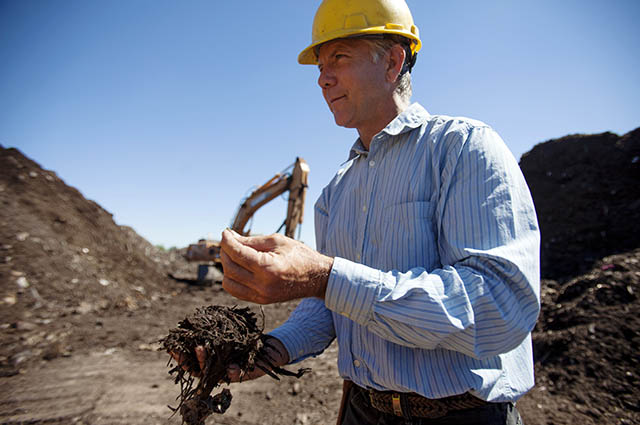Austin Composter Got Its Start Hauling Horse Manure

Phil Gosh, owner of Organics by Gosh, handles compost in the making at a company facility near Austin. Photo by Gabriel Cristóver Pérez.
By Barbara Zinckernagel
For Reporting Texas
Correction: This story has been changed to correct Phil Gosh’s quote about how many microorganisms are in a tiny amount of compost.
Nearly 80 years ago, Scott Gosh started a small family business in Austin, picking up horse manure from area farms and selling it to other farmers to fertilize their crops.
Today Phil Gosh continues his father’s legacy at Organics by Gosh, which turns food waste and other organic materials into compost for gardeners.
Customers, including the H-E-B grocery chain and numerous Austin hotels and restaurants, pay the company to pick up their food waste. The company also won the bid to process materials from the city of Austin’s pilot composting program, which began with 7,900 homes last December and will add 8,000 more in February.
The material is processed at two facilities on FM 979, east of Texas 130, where tons of food waste and yard trimmings are turned into compost and soil mixes.
OBG uses a “slow cook” method that takes from six months to two years. Piles of waste are watered and turned on schedule to keep the temperature at about 131 degrees, providing optimal living conditions for the microbes that break down the trash.
“Feel how hot it is. … One thumbnail of product contains more microorganisms than there are people on the planet,” Gosh said while holding a couple of surprisingly aromatic fistfuls of dirt he took from one of the brown hills at the facility. Nearby, a contractor is picking up samples for use at the Governor’s Mansion.
OBG sells its products at one of its composting sites, as well as through Home Depot stores in Austin and San Antonio and three other Austin garden stores.
By turning tons of garbage into commercial products, the company makes money, creates jobs and keeps trash out of landfills. Some compost mixes cost nearly $40 a cubic yard, with small bags costing $3.99. The company also sells mulches, landscaping rocks and sand.
“We are very grateful to recycle and to make a difference, but I would describe us as very practical more than idealist,” the 53-year-old Gosh said.
As a young man, Gosh studied criminology and didn’t plan to take over the family business, then called Happy Meadows Nurseries. When his father got into financial trouble, Phil stepped in to help and eventually took over in 1995.
He and wife Donna, the chief financial officer of the company, are composting evangelists and have traveled to Mozambique, on Africa’s east coast, where they funded and initiated a composting program for farmers.
“My wife and I have been in Mozambique twice this year,” Gosh said. “There is an organization called IRIS working with social work where we teach the staff and locals to reuse resources.”
Hopdoddy Burger Bar’s two Austin locations are among Organics by Gosh’s restaurant costumers. The restaurant started collecting organics when its first location on South Congress Avenue opened in October 2010.
“There weren’t too many options three years ago. A lot of composting companies don’t take meat, but Organics by Gosh provided us with everything and takes it all,” said Tony Pollock, director of operations for Hopdoddy.
Organizing the organics collection for the two locations outside Austin — Dallas and Scottsdale, Ariz. — was harder. “The available programs in most cities aren’t as extensive as in Austin. Composting is three times more expensive than sending it to a landfill, but it is worse in Dallas and even worse in Scottsdale,” Pollock said.
Other area companies collect food waste and turn it into rich compost, including Texas Disposal Systems, whose facility is in Creedmoor. Texas Disposal and New Earth of San Antonio were bidders for Austin’s composting pilot contract.
Ryan Hobbs, director of operations for Texas Disposal, and Mike Lininger, sales director for New Earth, said their companies would be interested in bidding for the expansion of the Austin composting program next year.
Winning the initial contract was a breakthrough for Organics by Gosh. The program has gone smoothly so far, according to Gosh and Austin Resource Recovery, the city’s trash department. Gosh said there’s still a need to educate people about what can and cannot be put into the compost containers the city picks up weekly.
Amid the large piles of compost in the making, plastic bags stick out everywhere, while a fork and a beer bottle lie close to each other as if someone tried to compost a dinner place setting along with the food scraps. “It takes some time to educate people. I think some get recycling and composting mixed up,” Gosh said.
“But a machine will get rid of all that before the composting is done,” he added while picking up the fork, the bottle and a few newspapers. Newspapers can be composted, but that’s done elsewhere at the facility.
Organics by Gosh staff take photos of the plastic bags and other material that has to be removed. The company charges the city a small fee for contaminants in the composting feedstock. If there’s no contamination, the city pays nothing.
Next spring the city plans to seek bids for a new, multiple-year contract that could grow to a citywide organics pickup by 2016, said Emlea Chanslor, marketing manager and public information officer at Austin Resource Recovery.
Gosh thinks his company will get the new contract. “Of course in business, you get thrown what happens, but we still feel that we are the best,” he said.